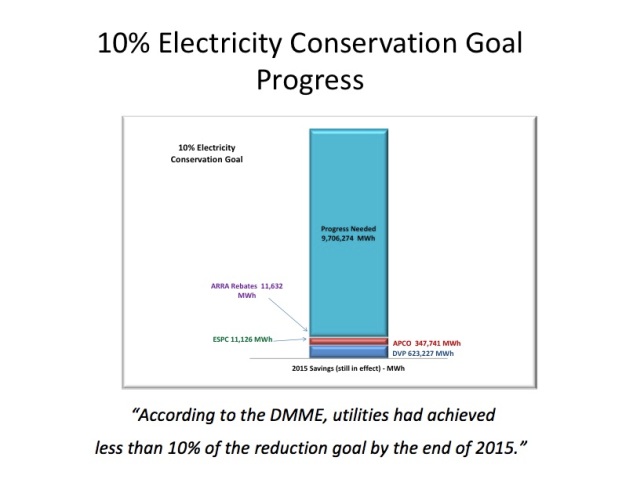- Dominion Energy ranks 50th in energy efficiency among the 51 largest electric utilities in the nation (ACEEE)
- Virginia has captured only 2% of its efficiency potential (EPRI)
- Robust energy efficiency policy in VA could increase employment by 38,000 jobs by 2030 (DMME Energy Plan 2014)
- VA’s residential electricity bills ranked 10th highest in the U.S in 2015, commercial bills ranked 13th highest (U.S. Energy Information Administration)
In the past year, numerous reports from research institutes, industry think tanks, and government entities have exposed Virginia’s poor energy efficiency performance. Considering the clear economic and environmental benefits that energy efficiency provides to Virginia’s businesses and residents, and in light of Virginia’s untapped energy efficiency potential, electric utilities should prioritize meeting demand through improving energy efficiency rather than building new expensive power plants.
Virginia Utilities Are Significantly Underperforming in Achieving Energy Efficiency.
Virginia’s largest investor-owned utility, Dominion Energy, holds a very weak record on energy efficiency – ranking 50th (next to last) in efficiency efforts among the 51 largest electric utilities in the nation, according to the American Council for an Energy-Efficient Economy (ACEEE). In this utilities report, Dominion Energy earned only 11% of total energy efficiency points (5.5 out of 50) and performed far worse than peer utilities in the Mid-Atlantic region (MD, NJ, PA, and VA). In contrast, Maryland’s BG&E utility company ranks 4th in the nation. In addition, a 2016 independent survey of the 30 largest investor-owned utility companies ranked Dominion last for energy efficiency using two separate measures.
Virginia investor-owned utilities are not even close to reaching Virginia’s voluntary energy efficiency goal of reducing electricity use by 10% by 2022 (relative to 2006 base consumption – equal to a reduction of 10.76 million megawatt hours). According to the Virginia Department of Mines, Minerals, and Energy (DMME), utilities had achieved less than 10% of the reduction goal by the end of 2015. In Dominion’s 2017 Integrated Resource Plan (IRP), State Corporation Commission (SCC) staff witness Eichenlaub testified that, based on current programs, Dominion Energy could achieve only 80% of the 10% reduction target by 2032—still deficient a decade late.

Even the electric utility industry’s own research organization (Electric Power Research Institute, or “EPRI”) reveals how far behind Virginia is in energy efficiency efforts. EPRI’s recent report shows that Virginia has captured only 2% of its efficiency potential. Based on current programs, policies and activities, Virginia will only achieve 7% of its energy efficiency potential by 2035, ranking near the lowest in the nation – 48th out of 50 states and the District of Columbia.
Achieving Advances in Energy Efficiency Will Reap Great Benefits for Virginia.
Improving energy efficiency is the lowest cost and most readily available resource to save money and meet energy demand. Energy efficiency consistently ranks as the lowest-cost resource—averaging 3 cents per kilowatt hour—and is one-half to one-third the cost of building new power plants.[i]While improving energy efficiency will obviously conserve natural resources, reduce pollution, and mitigate adverse health effects from air pollutants, improvements will also bring direct economic benefits to Virginia through job creation, increased economic competitiveness, and reduced electricity bills.

Energy efficiency is a growing industry in Virginia. According to the Virginia Energy Efficiency Council (VAEEC), revenue generated from this sector has increased from nearly $300 million in 2013 to $1.5 billion today. Energy efficiency currently already supports over 75,000 jobs in Virginia but it could support more. Indeed, Virginia’s Energy Plan states that robust energy efficiency policy could increase employment by 38,000 jobs by 2030.
Energy efficiency can help maintain and attract business to Virginia. Almost half of Fortune 500 companies (48% in 2016) have set greenhouse gas emissions reduction and/or energy efficiency targets. In Dominion’s 2017 IRP case, a coalition of data center providers and customers in Virginiarecently confirmed that their investors want them to reduce greenhouse gas emissions. Data centers constitute the largest share of Dominion’s forecasted load growth. Advanced Energy Economy confirms, “for many companies, the ability to control energy costs […] is a key factor when deciding where to locate or expand their operations.” By lowering greenhouse gas emissions, efficiency will make Virginia more attractive to businesses.
Improving energy efficiency will benefit consumers, especially low-income consumers vulnerable to increases in electricity bills. Dominion Energy claims to have among the lowest rates in the nation. Yet a report by the Virginia Poverty Law Center reveals that Dominion Energy’s rates are average and its bills have increased 30% between 2006 and 2016. Of that increase, 42% comes from rate adjustment clauses (RACs)[ii] – keeping the base rates low but resulting in higher bills. These increases impact low-income households more severely, as these households spend a greater proportion of their income on utilities than the average family. Rappahannock Electric Co-op recently confirmed that low-income customers often consume more electricity due to poor insulation and older, less efficient appliances.
Dominion Energy is planning several large new power plants to meet projected demand. Yet Virginia has great, untapped potential for reducing customers’ electric bills and meeting demand by pursuing energy efficiency instead. Advances in energy efficiency will grow Virginia’s economy, increase its economic competitiveness, and benefit consumers (especially low-income consumers).
Policy Recommendations
There are several regulatory obstacles to stronger utility energy efficiency action in Virginia. Other peer states have achieved significant advances through the following policies.
- Make the voluntary energy efficiency resource standard (EERS) a mandatory EERS.
- Broaden the State Corporation Commission’s cost-effectiveness criteria to include more energy efficiency benefits. This broadened definition would result in more energy efficiency programs being approved.
- Allow electric utilities to decouple their profits and sales, and provide utilities with performance incentives. (Decoupling has already occurred for Virginia natural gas companies.)
Key Recent Reports
- American Council for an Energy-Efficient Economy, Utility-Sector Energy Efficiency Performance in the Commonwealth of Virginia (2017).
- Electric Power Research Institute, State Level Electric Energy Efficiency Potential Estimates (2017).
- Virginia Energy Efficiency Council, Why Energy Efficiency is a Smart Investment for Virginia (2017).
- Virginia Poverty Law Center, The Myth of Virginia’s Rate Utopia: A Comparison of Rates, Riders, and Bills (May 3, 2017).
____________________
[i] For additional information on energy efficiency as a resource, see the Alliance to Save Energy’s Energy 2030 Reports, available at http://bit.ly/2BMHFl3, and McKinsey & Company’s 2009 report UnlockingEnergy Efficiency in the US Economy, available at http://bit.ly/2hf3HAM.
[ii] For additional information on Rate Adjustment Clauses (RACs), see Virginia Energy Purchasing Governmental Association’s Elected Official’s Guide to Ensuring Fair Regulation for Electricity at http://vepga.org/wp-content/uploads/2017/06/VEPGA_16SummaryUpdate_ElectedOfficialsGuide.pdf. One example of RACs are fuel adjustment clauses that affect prices for fossil fuels, such as natural gas and coal. Thus, when prices spiked during the polar vortex several years ago, the price increase is reflected in an RAC.
____________
About Melissa Christensen
Melissa is an intern with the Virginia Sierra Club Legislative Committee researching opportunities in energy efficiency. Having grown up in Belgium and recently lived in Shanghai for two years, Melissa is passionate about accelerating the world’s transition to a sustainable economy.


![Sunday News: “Trump Is Briefed on Options for Striking Iran as Protests Continue”; “Trump and Vance Are Fanning the Flames. Again”; “Shooting death of [Renee Good] matters to all of us”; “Fascism or freedom? The choice is yours”](https://bluevirginia.us/wp-content/uploads/2026/01/montage011126.jpg)

![VA DEQ: “pollution from data centers currently makes up a very small but growing percentage of the [NoVA] region’s most harmful air emissions, including CO, NOx and PM2.5”](https://bluevirginia.us/wp-content/uploads/2026/01/noxdatacenters.jpg)
![New Year’s Day 2026 News: Full Video of Jack Smith Testimony – “The attack that happened at the Capitol…does not happen without [Trump]”; Trump/RFK Jr Make Measles Great Again; Right-Wing YouTuber Nick Shirley Definitely Not a Real Journalist; Musk Did Enormous Damage in 2025](https://bluevirginia.us/wp-content/uploads/2026/01/montage010126.jpg)












